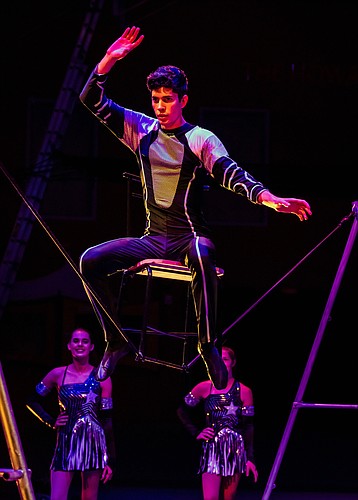- April 24, 2024
-
-
Loading

Loading

What do tightrope walking, biotechnology and a global video contest have in common? They are all aspects of one 2019 Pine View graduate’s life.
Jared Gracia-David is competing in the Breakthrough Junior Challenge, a contest for students ages 13 to 18 to create videos that illustrate a concept or theory in science or math. Out of 11,000 global entrants, Gracia-David is in the top 15 finalists and is in the running for $400,000 in prizes.
“It was really crazy to hear that I’m one of the finalists” he said. “It was really awesome to be in that top group because everyone is so talented.”
In his video Gracia-David explains moment of inertia, or an object’s resistance to rotation, drawing on his experience as a wire walker in the Sailor Circus.
“I really like the topic because usually people take the ability for circus arts — to walk on a tightrope — for granted,” he said. “There’s really much more to it, as I found out.”
Gracia-David heard about the contest and entered in 2018 with a focus on the same subject matter. However, he hadn’t yet taken physics, so he spent weeks researching and teaching himself everything he needed to know.
“I read about it in books, researched online, watched videos, talked to people,” he said. “It was quite a learning process.”
However, not long after submitting, he received an email stating his video had done well, but it wasn’t enough to be a finalist in the 2018 competition. So taking what he learned from the experience, Gracia-David expanded on his topic and upgraded his video skills for the following year.
“I learned what it takes to make an interesting video,” he said. “From making that video and watching it a bunch of times afterward, I learned what I needed to change for this year and what kinds of things had to be different to make it the most interesting video that I could.”
He wrote the script and edited the video himself, calling on a friend’s help for filming. In all, the video took him a few weeks to produce. From there, it was a waiting game.
On Sept. 11, Gracia-David found out he was in the top 30 contestants and his video, along with the other 29 contestants’, were posted to the Breakthrough Foundation Facebook page where they were up for a popular vote. The video that received the most likes and shares was automatically advanced to the final round.
Gracia-David said his family, friends and people he didn’t know shared the video, but he did not win the popular vote. However, he was still selected by a panel of judges to be in the top 15 finalists.
Now the videos of him and the other finalists will be evaluated by a selection committee comprising astronauts, professors and science media members, to name a few.
The winner, announced at the Breakthrough Prize ceremony hosted in Silicon Valley on Nov. 3, will be awarded a $250,000 college scholarship. Gracia-David said he would use the money toward his undergraduate degree at Amherst College and the rest toward a graduate degree in biology and possibly biotechnology.
The winner’s high school also will receive a state-of-the-art science lab valued at $100,000. Additionally, each contestant was asked to nominate a teacher who has inspired him or her. If the student wins, the nominated teacher will win a $50,000 prize.
For Gracia-David, the choice was simple. He nominated Pine View’s Rebecca Kehler, who was his ninth grade biology and 11th grade anatomy teacher.
Kehler served as a mentor for Gracia-David while he was working on projects, such as a investigating the effects of increasing concentrations of potassium on skeletal muscle contraction and comparing biofuel efficiencies among different groups of fungi. Kehler said Gracia-David has a natural passion for the sciences, and many of the projects he worked on were completed on his own time outside of school.
“He is one of most promising students I have had in my 29 years of teaching,” Kehler said. “He is a fine researcher and possesses uncompromising scientific rigor and spirit. I am confident he will do great things academically and professionally.
Although he said winning would be great, Gracia-David said he has learned a lot about himself during the process, and he hopes to continue educating others about science in the future.